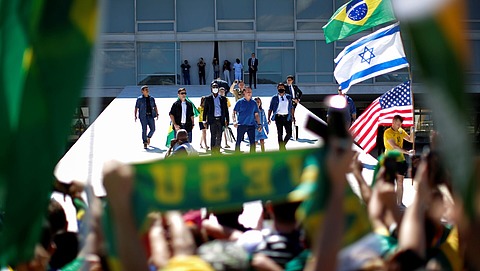Fernando Brancoli is a social scientist studying far-right Brazilian politics. Currently, his research is interested in Bolsonarismo, a term used to describe the non-cohesive coalitions orbiting President Jair Bolsonaro, as both a domestic phenomenon and one with international connections. From collaboration with the Trump administration, to gestures toward the Holy Land and Israel, Brancoli tracks the way internal discourses become informed by external discourses, reinterpreted and reformed, in Brazilian far-right organizations and subjectivities. The Summer Program in Social Science, funded by the Andrew W. Mellon Foundation and organized by James D. Wolfensohn Professor Didier Fassin, invites early-career scholars who are at an advanced stage of their research to join a two-year cycle of scholars from countries in Africa, the Middle East, and Latin America. Beginning with a two-week session in Princeton and followed by a week at a collaborating institution, the program aims to bring together different intellectual traditions, perspectives, and scientific disciplines to strengthen international networks among social scientists in the global South. Brancoli, a member of the 2021–23 cohort, spoke to us about his research and his experience in the Summer Program from his home in Rio de Janeiro.
Institute Letter: How did you end up studying far-right politics in Brazil? Do you have any specific inspirations?
Fernando Brancoli: Well, I’m a journalist by undergraduate training. And I was doing a lot of international journalism back in the day. I was working in the Middle East, in Africa, and also in Palestine and Israel. And during this specific period, I was able to track how a lot of those I interviewed were integrating in Brazil. I was interviewing, for example, private security companies in Afghanistan that were then hired here in Rio de Janeiro. So, during my Ph.D. work, I was trying to understand how those specific security groups were circulating amidst the global South. And then when Bolsonaro was elected four years ago, I slowly started to track that those guys are now in the government. It was like, ‘well, I actually interviewed you 20 months ago,’ or ‘I interviewed you three years ago,’ and they’re all getting key positions among the security positions in Brazil. I’m interested in how they create this discursive scenario which has a huge impact on how Brazil is now behaving internationally.
IL: Why switch from journalism to social science?
FB: I was missing, I think, a broader and deeper discussion. I mean, journalism, by nature, is a really quick and fast discussion. Journalists are supposed to be telling different stories every day, and I felt I was missing these, sort of, broad and important narratives.

IL: What unique perspectives do you think you bring as a Brazilian scholar?
FB: I think there is a huge discussion in Brazil right now, and among global South scholars, that we can actually produce theory. We can produce tools to understand the world, rather than just applying or reusing the methodological and epistemological discussions that people are doing in the global North. Like, in Brazil right now there’s a huge discussion regarding anthropophagy; for decades, the concept of anthropophagy has been used in Brazil to characterize the epistemological process of combining various foreign ideas and native thoughts. It’s coming back in the sense that we can engage different methodologies, different points of view from across the globe, and sort of mutate and digest it, and create something new.
IL: Has being at the Institute benefited your work?
FB: I think the whole structure of the Institute helps. We’re having lunch and dinner together. We’re having coffee together, as well. And then you have the Members joining us from time to time, coming over and commenting on our work. I mean, it’s like a dream for academics, right? People are going there to do their research, but also to engage in this specific type of collaborative thought. I’m quite sure if we were staying at different hotels, we wouldn’t be able to have this sort of engagement. It’s this broad scenario that tries to connect people and gives you all the tools to do this.
IL: What’s your favorite thing about where you’re from?
FB: I would say this sort of kaleidoscope of different perspectives and ethnicities and religions and discussions and food. I think we are at our best when we are meshing everything together. I think that’s the beauty of Brazil and also what is quite powerful about the country.
